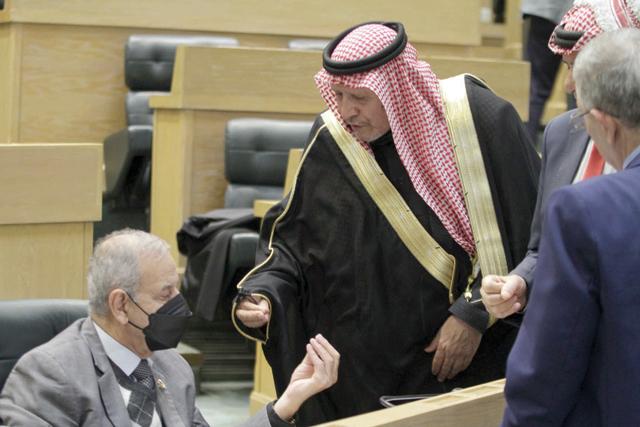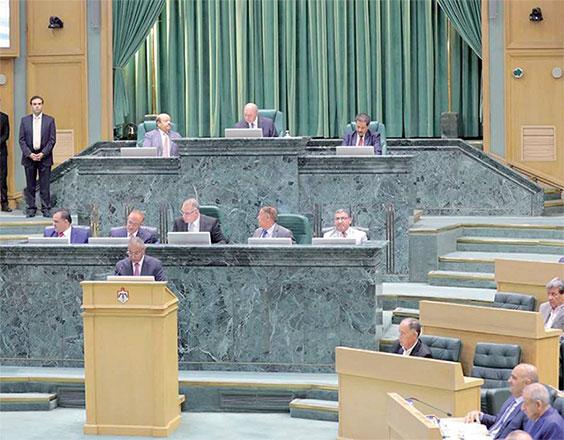You are here
Lower House passes slew of constitutional amendments
By JT - Jan 05,2022 - Last updated at Jan 05,2022

MPs are seen during a Lower House session on Wednesday (Photo by Hassan Tamimi)
AMMAN — The Lower House on Wednesday continued its deliberations on constitutional amendments.
The Lower House, with a majority of 100 votes, on Wednesday approved amending Article 72 of the Constitution, making the resignation of any lawmaker effective from the date of handing over the letter to the House speaker.
The move is meant to remove any obstacles hindering lawmakers’ participation in government, as well as to enhance the stability of parliamentary work, the Jordan News Agency, Petra, reported.
The MPs also approved amendments stipulating that there is no resignation of the government that recommend the dissolution of the Lower Chamber, in the event that the dissolution is within the last four months of the parliament's term.
In justification for this action, it was noted that dissolving the House during this period is meant to hold new parliamentary elections, in accordance with the Constitution, which does not necessitate the resignation of the government.
The amendment also aims to ensure equal opportunities for all candidates for parliamentary elections, as MPs remaining on the job during the four-month period could offer an advantage not enjoyed by other candidates, Petra reported.
Paragraph 2 of Article 74, approved by 96 MPs, stipulates: “In the event the Lower House is dissolved before the last four months preceding the end of its term, the government shall resign within a week of the date of the dissolution, and its head shall not be assigned to form the upcoming government.”
Paragraph 2 of Article 68 of the Constitution stipulates: “A general election shall take place during the four months preceding the end of the term of the Chamber. If the election has not taken place by the end of the term of the Chamber or if such election is delayed for any reason, the Chamber shall remain in office until the election of a new Chamber”.
Also on Wednesday, the lawmakers, with a majority of 111 votes, approved a constitutional amendment prohibiting members of both chambers of parliament, while in office, from concluding any contract, lease, sale, barter, or any other type of contract with the government, public institutions or government-owned or controlled companies.
The amendment to Articles 74 and 75 of the Constitution excluded cases in which a senator or a deputy, prior to membership, is a shareholder or partner with ownership of no less than 2 per cent, in addition to leases of land and property signed before membership, Petra added.
The Lower House, with a majority of 106 votes, out of 109 who attended the morning session, rejected the government’s amendment to Article 86 of the Constitution, which allows trial of the members of the lower and upper chambers, during the duration of the Parliament’s session.
The MPs voted in favour of preserving Paragraph 1 of Article 86, which states: “No Senator or Deputy may be detained or tried during the currency of the sessions of the National Assembly unless the House to which he belongs decides by an absolute majority that there is sufficient reason for his detention or trial or unless he was arrested flagrante delicto. In the event of his arrest in this manner, the House to which he belongs shall be notified immediately”.
According to recommendations of the Royal Committee to Modernise the Political System (RCMPS), the amendment could enhance the rule of law, as it grants House and Senate members the “necessary and sufficient” immunity to carry out their legislative and oversight role.
The MPs also approved to amend Article 88, related to refilling vacant seats in the Senate or in the Lower House, noting that there is no need to notify the government.
Article 88 of the Constitution reads: “When a seat becomes vacant in the Senate or in the Chamber of Deputies by death or resignation or for any other reason, it shall be filled by appointment in the case of a Senator and by the holding of a by-election in the case of a deputy within a period of two months from the date on which the Government is notified of the vacancy by the House. The term of the new member shall be for the remaining part of the term of the House.”
The Lower House approved amending Article 92 of the Constitution related to holding joint sessions of the Lower House and the Senate, in a way that allows forming a joint committee from both chambers to discuss controversial items of any draft law and agree on a final structure before referring recommendations to the two houses.
Also on Wednesday, the House agreed to unify the financial reference under one legal umbrella through providing Parliament with one draft law for the general budget that includes the budgets of government units.
The Lower Chamber, with a majority of 110 voted, approved amending Article 112 of the Constitution to refer a draft law for the general budget that includes the budgets of government units to Parliament at least one month before the end of the fiscal year, Petra added.
This amendment aims at granting the government the authority to monitor the revenues and expenditures of independent commissions, and at developing the mechanisms of parliamentary action by saving time and effort of lawmakers and senators in deliberating the draft law of the general budget.
Amending Article 84, the Lower House also added the laws of citizenship and personal status.
Paragraph 3, added to Article 84, passed by the Chamber, stipulates: “If the voting is related to the laws governing election, political parties, the judiciary, the independent commission, Audit Bureau, integrity and anti-corruption, the nationality and personal status laws, two-thirds of the members of both Houses must approve.”
Also, 105 deputies voted to add a new clause to the Constitution’s Article 119, which sets a time limit for discussing Audit Bureau reports by the two chambers of Parliament.
The new clause requires the Senate and the Lower House to discuss Audit Bureau reports during the session in which they are presented in, or the next regular session maximum, Petra added.
During the same session, the lawmakers also cancelled the phrase “police and gendarmerie” in Clause 2 of the Constitution’s Article 127 and replaced it with “public security”.
On Thursday, the House is scheduled to debate the remaining four article amendments of the Constitution, after deputies approved 26 out of 30 articles at eight continuous sessions over the past four days.
Related Articles
AMMAN — The Senate on Monday passed the 2016 constitutional amendments by sweeping majority as referred from the Lower House, the Jordan New
AMMAN — The two houses of Parliament on Thursday convened in a joint session, ending a dispute over major laws, approving amendments to the
AMMAN — The Cabinet on Monday endorsed amendments to five articles of the Constitution, one of which allows dual nationality for occupiers o















